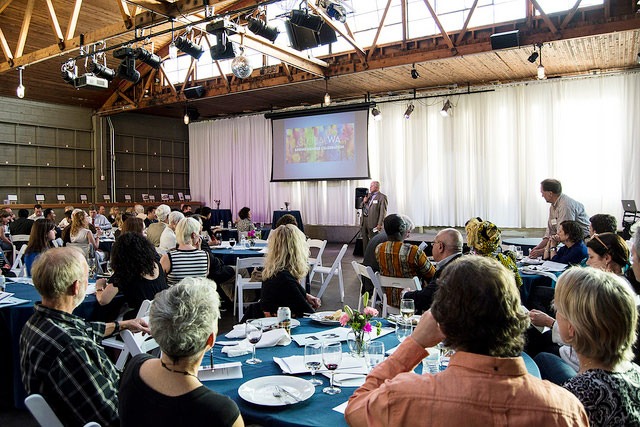Welcome to the June 2014 issue of the Global Washington newsletter. If you would like to contact us directly, please email us.
IN THIS ISSUE
- Letter from our Executive Director
- Question of the Month
- Member Perspective: World Economic Forum Africa: An Interview with Mark Suzman, President, Global Policy, Advocacy and Country Programs, Bill & Melinda Gates Foundation
- Featured Organization: Oxfam America
- Changemaker: Dennis Macray, Vice President for Sustainable Operations and Social Impact, Theo Chocolate
- See pictures from our Spring Member Celebration!
- Welcome New Members
- GlobalWA Member Events
- Career Center
- GlobalWA Events
Letter from our Executive Director
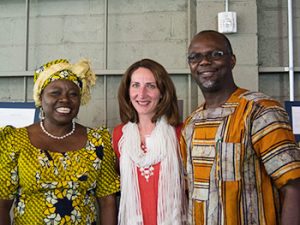 Is there really a community of international development organizations in Washington state? Or, are we all so heads down in our own work and grant requirements that it’s difficult to think about connecting with others? People are likely to fall at varying points on the spectrum, but there was a collective sense of affinity and energy for new relationship-building at Global Washington’s May 30 Spring Member Celebration.
Is there really a community of international development organizations in Washington state? Or, are we all so heads down in our own work and grant requirements that it’s difficult to think about connecting with others? People are likely to fall at varying points on the spectrum, but there was a collective sense of affinity and energy for new relationship-building at Global Washington’s May 30 Spring Member Celebration.
The festive atmosphere allowed people to share excitement about their programs and meet others doing similar work through NGOs, businesses, academic institutions and foundations. It was a great opportunity for people to meet face to face and establish a rapport that can continue into future collaborations. Some organizations even used the opportunity to present staff from outside the state, as well as outside the country, to our international development community.
Thank you to all who attended our celebration event, and to those who contributed. It was wonderful to reflect on the past success of Global Washington and to introduce our ambitious agenda going forward. I feel so honored to be part of this community, and I look forward to working with all of you in the months to come.
Sincerely,

Kristen Dailey
Executive Director

GlobalWA will ask you a question every month and synthesize the responses and make available to our member organizations. Please take a moment to respond to the question for this month:
What topic(s) would you like to see featured at GlobalWA’s monthly Executive Director Roundtable?
Member Perspective
World Economic Forum Africa: An Interview with Mark Suzman, President, Global Policy, Advocacy and Country Programs, Bill & Melinda Gates Foundation
By Dean Forbes
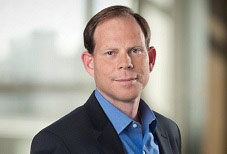 The 24th World Economic Forum on Africa, which took place May 7-9 in Nigeria’s capital, Abuja, came at a crucial time for the continent. Africa’s remarkable growth trajectory is projected to remain above 5 percent in 2014 with West Africa the fastest growing sub-region, representing the continent’s largest business opportunity. “Such momentum is a welcome and necessary boon to a region whose youthful population offers the prospects of a significant demographic dividend fuelled by growth in consumer industries, manufacturing and business process outsourcing,” according to the WEF.
The 24th World Economic Forum on Africa, which took place May 7-9 in Nigeria’s capital, Abuja, came at a crucial time for the continent. Africa’s remarkable growth trajectory is projected to remain above 5 percent in 2014 with West Africa the fastest growing sub-region, representing the continent’s largest business opportunity. “Such momentum is a welcome and necessary boon to a region whose youthful population offers the prospects of a significant demographic dividend fuelled by growth in consumer industries, manufacturing and business process outsourcing,” according to the WEF.
Taking place under the theme, Forging Inclusive Growth, Creating Jobs, the forum, a regional replica of the signature Davos, Switzerland event, brought together over 1,000 leaders from across politics, business and civil society to discuss innovative structural reforms and investments that can sustain the continent’s growth while creating jobs and prosperity for all its citizens.
Among those who attended the forum was Mark Suzman, President, Global Policy, Advocacy, and Country Programs for the Bill & Melinda Gates Foundation. Based in Seattle, the foundation is a member of Global Washington. Upon Suzman’s return, he kindly agreed to answer questions about the forum and Africa’s potential. What follows are his unedited written responses.
GlobalWA: A story in the Nigerian paper BusinessDay published a week before the forum characterized Africa as the world’s last economic frontier continent. Do you agree? How would you characterize the continent’s potential?
Mark Suzman: There’s no question the economic potential of Africa is huge. It is the second most populous continent, with more than a billion people, significant natural resources, a growing middle class, and a clear sense of momentum. More than half the world’s 10 fastest-growing economies are in Africa, and over the last decade, the economic growth rate in sub-Saharan Africa has surpassed that of most wealthy countries.
As someone born and raised in South Africa, it’s exciting to see the economic and social transformation that’s occurring across much of the continent. To be clear, the benefits of progress have not yet reached everyone in Africa, but for many, life has never been better. Income per person is up by nearly two-thirds since 1998. So there’s clearly reason to be optimistic about Africa’s future.
GlobalWA: The conference theme was “Forging Inclusive Growth, Creating Jobs,” and organizers acknowledged the challenges of needed structural reforms while delivering benefits to all of its citizens. From your perspective, what are the key issues that must be addressed in order for the continent’s economy to grow while channeling the benefits of that growth to its people?
Suzman: The change has to start with each country prioritizing and making the kinds of investments domestically that are necessary to lay the groundwork for economic growth. There are many areas for policy change and investment that can have a great impact. Education, for example, and certain types of infrastructure investments such as roads that enable small farmers to move crops to market, energy-generation projects, and essential municipal facilities and services.
Our primary areas of focus at the foundation are agricultural development and health. We know from experience that countries that are investing in these areas are seeing those investments pay off in the form of poverty reduction, reduced child mortality and better health, and stronger economies. And, significantly, public-sector investments in areas with a proven track record of contributing to economic growth also attract other sources of investment – from donor governments, the private sector, and newer development actors such as our foundation and others.
GlobalWA: Are there certain job-creation strategies that are likely to be more effective than others in Africa?
Suzman: Breaking the cycle of early death, disease, and poverty is fundamental to the development of stronger economies and jobs creation. Health and agricultural development are two of the key levers that can do that.
Farmers make up two-thirds of the workforce in Africa, so helping smallholder farmers increase the productivity of their crops enables farming families to eat more nutritionally-diverse diets, send their children to school, and live better lives. And when farmers’ income increases, it stimulates growth in other sectors of the economy.
African countries that have invested significantly in agriculture (around 10 percent of their budget) are realizing impressive returns. In fact, all but one of the African countries making this level of investment is on track to halve extreme poverty by 2015.
Similarly, African countries that are significantly stepping up their investments in health are seeing the payoff. Ethiopia is a case in point. Their ambitious agricultural agenda has mobilized key donors – including USAID, the World Bank, and our foundation. In 2012, more than 500,000 farmers received training in new agricultural practices that are expected to significantly increase yields and reduce post-harvest losses. Efforts are also underway to link smallholder farmers with new markets and strengthen farmer cooperatives.
With donor support, Ethiopia has also significantly increased spending on health. As recently as 1990, one in five Ethiopian children died before the age of five – many in the first month of life. The child mortality rate has since dropped to one in five. A key factor in this advance is Ethiopia’s mobilization of more than 34,000 health workers who now reach the vast majority of Ethiopia’s population of more than 90 million. The health services are basic, but they have significantly improved people’s lives. Health workers deliver babies and administer vaccines. Health posts are stocked with malaria drugs and supplements that provide essential micronutrients like folic acid and Vitamin A. Use of modern contraceptives has risen four fold, giving women the opportunity to plan their families. Children are healthier, doing better in school and missing fewer days of class.
These kinds of investments – in health and agriculture – have helped underpin the growth of Ethiopia’s economy. Between 2000 and 2012, the country’s gross domestic product quadrupled to $40 billion, and the gross national income per capita more than doubled – from $467 to $1,110.
GlobalWA: Are there lessons for African officials to be learned from the economic growth models, including increased urbanization, of China and India?
Suzman: Countries like China and India—and Brazil and Mexico—are in a great position to work closely with African countries because they have recent experience in reducing poverty. They also have large cadres of well-educated scientists and engineers able to innovate in relevant ways. This unique combination gives them both the insights and the skills to create breakthrough tools for development. It’s exciting to see the potential of these kinds of partnerships. Ethiopia, for instance, is talking with China about its agricultural extension model, and Nigeria is talking with Brazil about its agricultural development and nutrition model that has been so successful in recent years.
About the WEF
The World Economic Forum is an international institution committed to improving the state of the world through public-private cooperation in the spirit of global citizenship. It engages with business, political, academic and other leaders of society to shape global, regional and industry agendas. Incorporated as a not-for-profit foundation in 1971 and headquartered in Geneva, Switzerland, the Forum is independent, impartial and not tied to any interests. It cooperates closely with all leading international organizations (www.weforum.org).
Featured Organization
Oxfam America
By Holly Koch
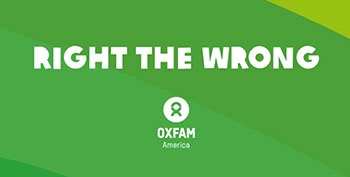 From the Southeast Asian tsunami in 2004, Hurricane Katrina in 2005, the Haitian earthquake in 2010 and, most recently, last year’s Philippine typhoon, news headlines have often been dominated by stories of the devastating effects of natural disasters. In response, the American public has taken to their checkbooks.
From the Southeast Asian tsunami in 2004, Hurricane Katrina in 2005, the Haitian earthquake in 2010 and, most recently, last year’s Philippine typhoon, news headlines have often been dominated by stories of the devastating effects of natural disasters. In response, the American public has taken to their checkbooks.
Since 2000, GlobalWA member organization Oxfam America, one of the Oxfam confederation’s seventeen affiliated organizations, has seen an approximate 250% increase in revenue, due in large part to charitable giving for disaster relief.
“We’ve been very lucky and grateful that many of the donors that came to us initially with a one-time donation for a natural disaster have stayed with us as donors for the long run,” said Oxfam Senior Advocacy Advisor, Jonathan Scanlon. This “long run” support is essential to combatting the effects of climate change, for which Oxfam asserts is the cause of the increased frequency and severity of storms.
Highly ranked by Charity Navigator, Oxfam’s mission is to right the wrongs of hunger, poverty and injustice. “We work mainly in three areas,” said Scanlon, “the first being in humanitarian response, the second part is longer-term poverty reduction work, and the third area of our work is campaigning.”
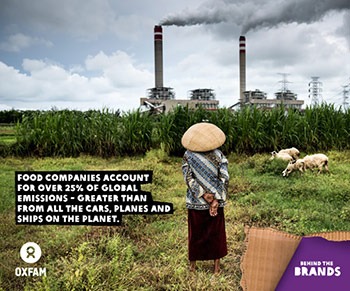 Climate change has become a top priority for Oxfam. “On the programmatic side, we do a lot of work with farmers and a lot of work with people in low-lying areas,” said Scanlon. This includes investing significant resources into disaster risk reduction, as well as helping farmers adapt to rainfall changes, which have a large effect on how, what, and when farmers plant their crops.
Climate change has become a top priority for Oxfam. “On the programmatic side, we do a lot of work with farmers and a lot of work with people in low-lying areas,” said Scanlon. This includes investing significant resources into disaster risk reduction, as well as helping farmers adapt to rainfall changes, which have a large effect on how, what, and when farmers plant their crops.
Scanlon continued, “On the advocacy side of things, this is something we’ve been campaigning on for probably the last eight to ten years or so,” which has included pushing for funding and the examination of government and company policies as they relate to the mitigation of, and adaptation to, climate change.
One of Oxfam’s climate-related projects is a crop insurance program in Ethiopia. “In the U.S. and in many other countries, farmers have this backup option in years of low rainfall; they have some insurance that they pay into,” explained Scanlon.
What began as a small-scale venture in Ethiopia with the government, state organizations and the global insurance company, Swiss Re, has expanded to a few other countries and has even become part of the work of the World Food Program.
“It’s been a successful initiative, providing more security for farmers in Ethiopia, and we think this is something that will be increasingly important as climates and rainfall patterns continue to change in countries around the world.”
Larger scale efforts of Oxfam to tackle climate change have included its more recent Behind the Brands campaign, in which it examines the practices and policies of the food and beverage industry’s “Big Ten.”
The campaign attempts to single out General Mills and Kellogg’s, two companies with the worst scores among its rubric of seven themes (transparency, women, workers, farmers, land, water and climate) in an attempt to use their size and influence to become industry leaders in efforts to reduce greenhouse gas emissions and deforestation.
“In general, we’re saying it’s governments, it’s companies and investors, that really have the responsibilities here because they’re the most powerful actors,” explained Scanlon. Consumers have a part to play, as well, he said.
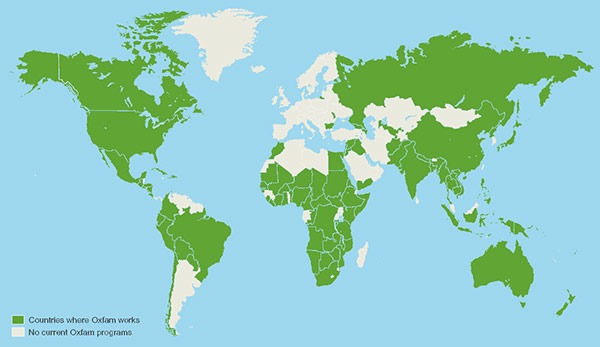 “We have the responsibility to make changes in our own behaviors and our own policies,” Scanlon continued. “We believe that if we make changes in the right direction, we can still have an impact on those that are living in poverty and are seeing the direct consequences of climate change.”
“We have the responsibility to make changes in our own behaviors and our own policies,” Scanlon continued. “We believe that if we make changes in the right direction, we can still have an impact on those that are living in poverty and are seeing the direct consequences of climate change.”
Like many of GlobalWA’s members, much of the work that Oxfam America does largely takes place out of sight of the developed world. But, climate change will have very personal repercussions over the coming centuries, as made painfully evident by the recently released study on the impending collapse of the Antarctic Ice Sheet.
“This is going to have an impact on those of us living right here in the Puget Sound,” said Scanlon. ”When you look at the impact of a ten foot rise in sea level, it’s scary as far as what would be underwater and what would be left.”
It is information like this that Scanlon and his Oxfam America team hope will inspire people to proactively fight for the future of themselves and others. “It’s the kind of thing that we can take action on here in this area,” said Scanlon. “And, we can have an impact – not only locally, but we can have an impact globally.”
Changemaker
Dennis Macray, Vice President for Sustainable Operations and Social Impact, Theo Chocolate
By Holly Koch
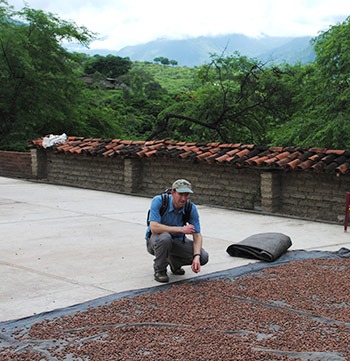 When President John F. Kennedy signed an Executive Order to kick-start the Peace Corps program in 1961, he was undoubtedly hoping it would be people like Dennis Macray that would take up the mantle for global service.
When President John F. Kennedy signed an Executive Order to kick-start the Peace Corps program in 1961, he was undoubtedly hoping it would be people like Dennis Macray that would take up the mantle for global service.
After graduating with a degree in Political Science from Harvard University, Macray completed his two years as a Peace Corps volunteer in the western highlands of Guatemala, where his passion for fair trade and sustainable environmental practices in coffee and cocoa took root.
“When you’re young and impressionable you think, ‘This is a huge issue,’ and you realize you have to do something about it,” said Macray of his reaction to harmful coffee production methods and practices he witnessed while in Guatemala.
While those years of service are often life changing for volunteers, it is safe to say that Macray’s continued pursuit of corporate social responsibility (CSR) in agricultural supply chains throughout his career is both unique and admirable.
Inspired by his experiences in Central America, Macray chose to attend UC Berkeley’s Haas School of Business because of its CSR program. “What I was looking at,” he explained, “was how do you get the private sector to be more responsible, and support a new model of social enterprise?”
While at Haas, in addition to attempting to answer that question, Macray was a founding member of Net Impact, or as it was known at the time, Students for Responsible Business, a membership organization with a mission “to make business different.”
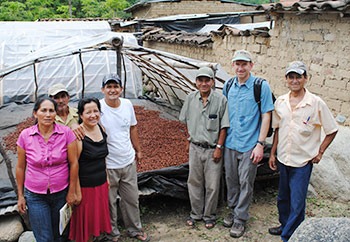 “Today I see business schools around the country competing to have the best CSR program,” explained Macray. “That didn’t exist when I went to business school so, at the time, it was a pretty radical idea we had.”
“Today I see business schools around the country competing to have the best CSR program,” explained Macray. “That didn’t exist when I went to business school so, at the time, it was a pretty radical idea we had.”
Since graduating from UC Berkeley, Macray has spent considerable time working with farmers in dozens of developing countries, and has become a go-to expert for many of the most influential organizations in his field. For the Bill & Melinda Gates Foundation, a GlobalWA member, Macray consults on its East African Coffee Initiative, as well as its Cocoa Livelihoods Program in West Africa.
For the World Cocoa Foundation (WCF), his consulting is largely based on setting metrics. According to Macray, “The WCF is unique in that it was established to address the needs of everyone along the value chain in the cocoa industry,” making his contributions vital to the WCF’s efforts to track progress in sustainable cocoa production.
Integral to his knowledge base were the eight years he spent at Starbucks as the company’s Director of Global Responsibility. While there, he utilized his experiences at Conservation International, helping fledgling enterprises choose sustainable income over destructive environmental practices as a means of survival, to strengthen the company’s sourcing policies for coffee, cocoa and manufactured goods.
“In developing C.A.F.E. Practices [Starbucks ethical sourcing program for coffee], I wanted to make sure we had very rigorous requirements for preserving the environment in coffee production and keeping that as a core principle for all of the coffee that Starbucks purchased,” explained Macray.
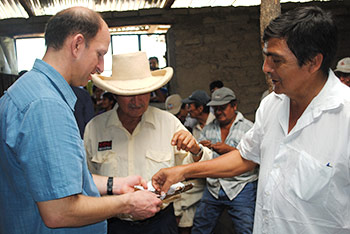 Recently, Macray made a big move to a much smaller company, Theo Chocolate, another GlobalWA member, where he is Vice President for Sustainable Operations and Social Impact. Of his role, Macray explained, “I have the responsibility for looking across all aspects of the company to ensure that it is committed to its mission and to sustainability.”
Recently, Macray made a big move to a much smaller company, Theo Chocolate, another GlobalWA member, where he is Vice President for Sustainable Operations and Social Impact. Of his role, Macray explained, “I have the responsibility for looking across all aspects of the company to ensure that it is committed to its mission and to sustainability.”
To partake in Macray’s tour of the Theo factory, and to listen to his explanation of its processes, is to understand that his dedication to Theo Chocolate and to the principles on which it holds itself up is unimpeachable. So, when Macray says, “We have a very strong focus on making lives better where we do business,” he means it.
Of his passion for sustainability and fairness along the value chain, Macray said,
“My dream is that more people will start to ask questions about where a product came from and how it was produced.”
He continued, “Rather than having a race to the bottom in global trade, we should all be racing to the top, and consumers can make that difference.”
See pictures from our Spring Member Celebration!
See our flickr photo set here: https://www.flickr.com/photos/globalwa/sets/72157644981662185/
Welcome New Members
Please welcome our newest Global Washington members. Take a moment to familiarize yourself with their work and consider opportunities for support and collaboration!
Atlas Members:
Bastyr University: A regionally accredited, globally respected institution of natural health arts and sciences, Bastyr University is improving the planet through innovative education, research and clinical service. www.bastyr.edu
Office of Global Affairs, UW: The Office of Global Affairs at UW is a central organizational hub, connecting diverse internal and external networks of scholars, students and community leaders engaging in international issues and scholarship. http://www.washington.edu/globalaffairs/
Cascades Members:
Dreams for Orphans: Dreams for Orphans is a Seattle-based 501(c)3 and NGO working in Ghana to provide safe environments and educational opportunities for those who need them most. They support infants and children who have been abandoned or abused. Over the last five years, they’ve helped hundreds of orphans live a better life by helping to change their living and learning conditions. http://dreamsfororphans.org/
Women’s Empowerment Cancer Advocacy Network: The Women’s Empowerment Cancer Advocacy Network (WE CAN) conducts breast and cervical cancer advocacy, education and outreach conferences in low and middle resource countries. The goal is to connect, train and support leaders of women’s cancer NGOs, health care providers and policymakers who support patient empowerment. http://globalhealth.washington.edu/node/7726
Member Events
June 17, 2014: Pangea // Looking For A Way to Connect Locally to Engage Globally?
June 23, 2014: WCTA // Clean Technology Showcase
June 24, 2014: Seattle University // Coffee Conversation & Seattle University Campus Tour
June 27, 2014: Third Sector Company // Succession Planning for Nonprofit Organizations
June 28, 2014: World Bicycle Relief // Red-Bell 100
July 14-18, 2014: The University of Washington School of Law // Global Health Law Summer Institute
August 4-8, 2014: Global Visionaries // Global Leadership Summer Institute 2014
Ongoing: GlobalWA network registration discount // 2014 Independent Sector National Conference
Career Center
Highlighted Paid Positions
Regional Director – Global Impact
Director of Development, Advocacy, and Communications – Committee for Children
Capital Resource Operations Officer – Global Partnerships
Senior Consultant – FSG
Highlighted Volunteer Positions
Volunteer – Planned Parenthood of the Great Northwest
Highlighted Internship Positions
Grant Writer Internship – Global Visionaries
Intern – One Equal Heart Foundation
For more jobs and resources, visit https://globalwa.org/strengthen/careers-in-development/
GlobalWA Events
June 19:
Networking Happy Hour with Friends of GlobalWA & Humanosphere
July 16:
New Member Orientation
July 17:
Executive Director Roundtable
